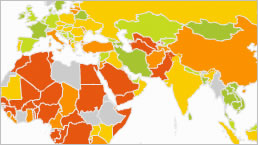| Sep 20, 2023
The GPFI Terms of Reference set out: (i) Purpose of the partnership/Overall consideration; (ii) Membership; (iii) Organization of work; (iv) The roles and responsibilities of all GPFI members in the execution of the activities of the GPFI; (v) The outputs; (vi) G20 and GPFI-branded InitiativesClick here to view the document.
| Sep 20, 2023
Our aspiration is to build a world where every individual has equal access to formal financial services, irrespective of their location, background or socioeconomic condition. We believe that financial inclusion is a powerful driver of economic growth and social progress, enabling countries to attain at least seven out of the seventeen SDGs and contributing to the 2030 agenda. The G20 2023 FIAP comes at a time when we are only seven years away from our 2030 deadline. Recognizing the crucial timeline and the role of financial inclusion in enabling countries’ progress towards achieving the relevant SDGs, the GPFI will use the G20 2023 FIAP to build a three-year mission for addressing the ‘last mile’ and moving closer to universal financial inclusion, and hence towards the attainment of SDGs.
Report | Aug 17, 2023
This implementation guide for the High-Level Principles (HLPs) for Digital Financial Inclusion builds on the GPFI’s work and aims to provide practical guidance on effective implementation of the HLPs. The guide is for policy makers from countries in various stages of development. The guide dedicates individual chapters to HLPs 1–6 and emphasizes practical “how-to” approaches and replicable examples of good practices, as well as highlighting potential risks. Each chapter also features additional resources that policy makers can consult on that topic.
Report | Nov 15, 2021
This report examines the factors that have contributed to the resilience of remittances during the pandemic and extracts key lessons learned on consumer behaviour, market performance and the creation of an enabling regulatory environment
Report | Nov 15, 2021
This report provides a summary of the impact of the pandemic on financial consumers and financial inclusion, a global view of the measures implemented to support financial inclusion and protect financial consumers, and sets out the lessons learnt and effective approaches that can be drawn from the experience.
Report | Nov 15, 2021
This report analyses the relationship between MSMEs’ financial literacy, digitalisation and impact of the COVID-19 crisis. The report relies on a dedicated data collection exercise promoted by the G20 Italy Presidency 2021, using the OECD/INFE 2020 survey instrument to measure the financial literacy of MSMEs. Fourteen G20 and non-G20 members participated in the data collection on a voluntary basis, including the following G20 countries: Brazil, China, France, Germany, Italy, Mexico, Russia, Saudi Arabia, Turkey; and the following non-G20 countries: Georgia, the Netherlands, Peru, Portugal, Spain.
Report | Nov 15, 2021
This report discusses the concept of financial resilience and its relationship with financial inclusion, financial literacy and financial well-being. It then offers a wide range of case studies looking at the role of digital financial education initiatives addressing financial resilience and vulnerability. It concludes by proposing a set of effective approaches describing how the digital financial education programmes can support individual financial resilience and long-term well-being
Report | Nov 15, 2021
The report presents a stocktaking of various cases and examples that highlight policy and regulatory approaches as well as private sector initiatives in G20 and non-G20 countries.
| Nov 30, 2020
Remittances represent a major source of income for millions of families and businesses globally, and are an important pathway to financial inclusion. This report outlines the measures taken by the G20 countries and the progress to improve the transparency in the market for international remittances and to reduce the cost of sending remittances.Click here to download the report.
| Nov 23, 2020
On 24 June 2020, GPFI members convened virtually for the Second GPFI Plenary Meeting under the Saudi G20 Presidency. The agenda items included COVID-19 Pandemic and the global economic response. Members discussed various activities taken by their countries/organizations to combat the impact of COVID-19 pandemic on the economy and its consequences on people’s livelihood. With the conclusion of the Second Plenary Meeting, GPFI members issued a Statement on COVID-19 Response, reaffirming the G20 commitment under the G20 Action Plan in response to COVID-19 pandemic. Through the issued statement, GPFI Members affirmed their commitment to promote financial inclusion through sharing their country experiences and measures to mitigate the impacts brought by COVID-19. In accordance with the G20 GPFI


